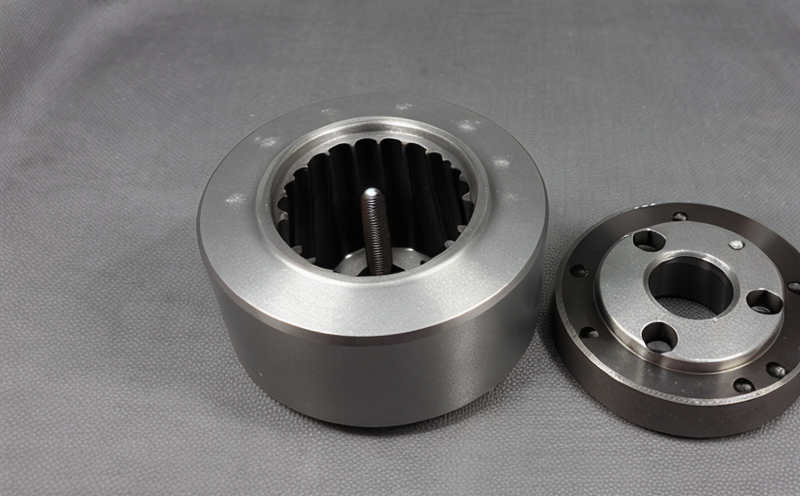ASTM B962 Density of PM Materials by Archimedes Method
The ASTM B962 standard specifies a method for determining the density of powder metallurgy (PM) materials using the Archimedes principle. This test is essential in quality assurance and R&D to ensure that the manufactured components meet the required specifications. The procedure involves submerging the sample in a liquid medium, typically water or another suitable fluid, and measuring the buoyant force exerted on the object. From this measurement, the density of the material can be calculated.
The Archimedes method is particularly useful for PM materials due to their complex shapes and potential internal porosity. The precision and accuracy of the test are paramount in ensuring that these materials meet stringent quality standards set by international standards like ISO 16875-1, ASTM B962, EN 14342, and others.
Material testing laboratories equipped with this method ensure that every sample is prepared meticulously. The specimen preparation process is critical as it can affect the test results significantly. Proper cleaning, drying, and conditioning of samples are essential to avoid errors in density measurement. After preparing the specimens, they are submerged in a liquid medium, and the displacement volume is measured accurately.
The Archimedes method is widely used across various industries including automotive, aerospace, and medical devices. Automotive manufacturers rely on this method to ensure that their components meet stringent durability and performance standards. In the aerospace sector, density testing ensures that materials are lightweight yet robust enough for space travel applications. In the medical device industry, precision in material density can affect the safety and efficacy of implants.
The ASTM B962 standard provides detailed instructions on how to conduct this test correctly. It outlines the necessary equipment, including a balance, water displacement apparatus, and a liquid medium. The choice of fluid is critical; for instance, distilled water is preferred due to its purity, which minimizes errors in the density calculation.
Quality managers and compliance officers can rely on ASTM B962 for consistent and accurate density testing. R&D engineers benefit from this method as it helps them understand the material properties better, leading to improved product design and performance. Procurement teams ensure that they receive high-quality materials by leveraging this standard during supplier audits.
Why It Matters
The density of PM materials is a critical parameter in quality control and assurance. Accurate knowledge of the material's density ensures that it meets the required specifications, which is essential for product performance and reliability. In industries where precision is paramount, such as aerospace or medical devices, even small variations in density can lead to significant issues.
- Improved Product Performance: Ensures that components are lightweight yet robust, enhancing overall product efficiency.
- Achieving Safety Standards: In medical devices and aerospace applications, compliance with density specifications is crucial for safety and performance.
- Consistency in Production: ASTM B962 helps maintain consistent quality across different batches of materials, ensuring uniformity in product characteristics.
- Economic Benefits: Reducing material waste through accurate testing can lead to cost savings for manufacturers.
The Archimedes method provides a reliable and repeatable way to measure the density of PM materials. This ensures that all stakeholders, from R&D teams to procurement officers, have confidence in the quality and performance of the materials they use.
Applied Standards
The ASTM B962 standard is widely recognized and applied across various industries for density testing of PM materials. Other relevant standards include ISO 16875-1, EN 14342, and IEC 60068.
| Standard | Description |
|---|---|
| ASTM B962 | Method for determining the density of powder metallurgy materials by Archimedes method. |
| ISO 16875-1 | Materials testing - Calculation and use of density. |
| EN 14342 | Test methods for metallic powder metallurgy materials. |
| IEC 60068 | Environmental conditions - Test standards. |
The combination of these standards ensures that the testing process is consistent and meets international quality benchmarks. By adhering to these standards, manufacturers can ensure that their products are reliable, safe, and meet regulatory requirements.
Use Cases and Application Examples
- Aerospace Industry: Ensuring that materials used in aircraft components are lightweight yet robust, enhancing fuel efficiency and performance.
- Automotive Sector: Verifying the density of PM parts to ensure they meet durability standards for engine components like gears and bearings.
- Medical Device Manufacturing: Guaranteeing that implants have the correct density to enhance biocompatibility and longevity.
- Electronics Industry: Ensuring that electronic components are made from materials with consistent density, enhancing reliability in high-performance devices.
| Use Case | Description |
|---|---|
| Aerospace Components | Ensures lightweight and robust components for aircraft engines and frames. |
| Automotive Parts | Guarantees durability of gears, bearings, and other engine components through accurate density testing. |
| Metallic Implants | Ensures biocompatible and long-lasting implants by verifying the correct material density. |
| Electronics Devices | Enhances reliability of high-performance electronic devices through consistent component materials. |
The Archimedes method, as specified in ASTM B962, is a cornerstone for ensuring the quality and performance of PM materials across various industries. Its application ensures that products are not only reliable but also meet international standards, enhancing their overall safety and efficacy.





